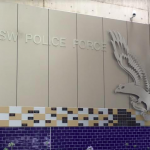Corruption and Misconduct Still Pervade the NSW Police Force

Former NSW police sergeant Nigel Alfred Davey was found guilty of common assault and perjury in Queanbeyan Local Court on December 12. Magistrate Michael Antrum ruled that Davey lied in court in October 2014, when he said a Nowra man was armed with a knife at the time he tasered him.
On June 14 2013, Davey tasered an unarmed Regan Sutton from five metres away, whilst he was still sitting in his car. By the time of the Nowra hearing against Sutton, Mr Davey was on suspension from the police force, due to an incident on January 26 2014 that also involved a taser.
Mr Davey originally claimed that after he stopped alongside Mr Sutton’s car on Mackay Street in Nowra, Sutton had approached his vehicle and tried to stab him. The ex-cop tasered Sutton a total of three times.
However, under cross-examination, Davey said he couldn’t remember seeing the knife in Sutton’s hand. And nor could he account for his assailant standing five metres away from his car, while at the same time being close enough to threaten to stab him.
Davey had his employment with NSW police terminated in 2015. And he’s set to be sentenced over the Sutton incident on Friday.
The new police watchdog
The investigation into Mr Davey’s conduct was overseen by the Law Enforcement Conduct Commission (LECC), which came into existence on July 1 last year. It was established via a bill that was introduced into NSW state parliament by police minister Troy Grant in September 2016.
The new police oversight body replaced the Police Integrity Commission (PIC), the police division of the Ombudsman’s office and the Inspector of the NSW Crime Commission (NSWCC).
As part of its new role, the LECC produced the Police Integrity Commission Annual Report 2016-17, which was released on December 18. The report lists a total of 17 former and current NSW police officers that were prosecuted over the last two years in part due to PIC/LECC investigations.
Acquitted on misconduct charges
These investigations included the prosecution of four NSW police officers accused of lying about the shooting of mentally ill man Adam Salter in 2009.
The investigation was sparked after a 2011 coronial inquest found that it was likely sergeant Sheree Bissett had mistakenly reached for her gun, rather than her taser, when she shot Mr Salter. But, the officers were found not guilty at the Downing Centre District Court on June 23 2016.
And a total of six NSW police officers were cleared of charges in December 2016 over the alleged bashing of Corey Barker at Ballina police station in early 2011. Four of the officers were accused of assaulting the Aboriginal man, while all six were said to have falsely claimed he’d committed a crime.
The Wood Royal Commission
Last year, marked 20 years, since the Royal Commission into the NSW Police Service delivered its final report. The commission found that NSW police culture had developed a set of values and rules that often contradict “the formal written laws, regulations and guidelines regarding police practice.”
Police culture was shown to be marred by a cynical and pessimistic attitude to the social environment. And it also permitted sexism, a glorification of alcohol, and a prejudice “attitude towards minorities.”
The Wood Royal Commission was held over the years 1995 through to 1997. The investigation focused on the existence and extent of corruption in the NSW police force. And it made recommendations in regard to improving accountability within it.
One of the Royal Commission’s recommendations was to establish a permanent body to investigate police corruption. This led to the PIC being brought into existence via the Police Integrity Commission Act in July 1996.
Recruiting the other side
However, despite efforts to stamp out corruption, criminality continues to be entrenched within the culture of NSW police. A 2014 Fairfax Media report, based on figures obtained via freedom of information laws, found that the force was recruiting hundreds of former criminals.
The report revealed that recently recruited officers had been convicted of 414 offences before entering the force. These included cases of break, enter and steal, fraud, drug and firearms crimes, along with over 100 drink driving offences.
Indeed, one in 40 officers had committed an offence either prior to or after joining NSW police.
A former police officer, Richard McDonald, obtained the figures. He outlined that the number of police with convictions had risen by 250 percent since 2008, while the number of officers in the force had only increased by 6 percent over the same period.
Dozens before the courts
A News Corp report revealed in April 2016 that 32 police officers were currently suspended whilst waiting to go before the courts, and another 21 were still on duty after allegedly having broken the law.
At the time, NSW police officers were facing rape, child sexual assault, drug supply, and stalking or intimidation charges.
Responding to the report, then NSW police commissioner Andrew Scipione said that he was “frustrated and bitterly disappointed” that any officers were betraying their oaths. While police minster Grant denied NSW police had any cultural problems.
Corrupt watchdogs
And early last year, it came to light that dozens of former and current police officers had been subjected to invasive and unwarranted investigations by the NSWCC’s Taskforce Mascot, which was established in 1999, following the Wood Royal Commission.
The taskforce was staffed by former NSW police officers and charged with investigating allegations of corruption in the force. However, an inquiry into Mascot revealed that it was investigating some officers with clean records, as well as others it’s staff had personal differences with.
After complaints were made over the conduct of Taskforce Mascot operations, another internal investigation was established in 2003, codenamed Strike Force Emblems. But, the new body was soon disbanded, as the NSWCC refused to issue affidavits to allow it to secure surveillance warrants.
Police investigating their own
The LECC’s establishment followed recommendations made by former NSW shadow attorney general Andrew Tink in a police oversight report released in August 2015.
However, then acting NSW Ombudsman John McMillan warned in September 2016 that the LECC would have seriously limited powers.
On the day minister Grant introduced the LECC legalisation, NSW Greens MLC David Shoebridge expressed concerns about the new model, as it leaves the oversight body to simply monitor police investigations, rather than actually conducting them itself.
“We have an inherent conflict of interest when police investigate police,” Mr Shoebridge told Sydney Criminal Lawyers® back in August 2016. “It means nobody can have faith in the independence of the investigation.”








